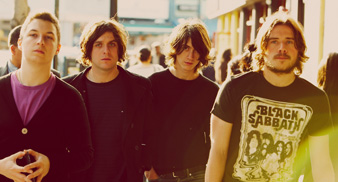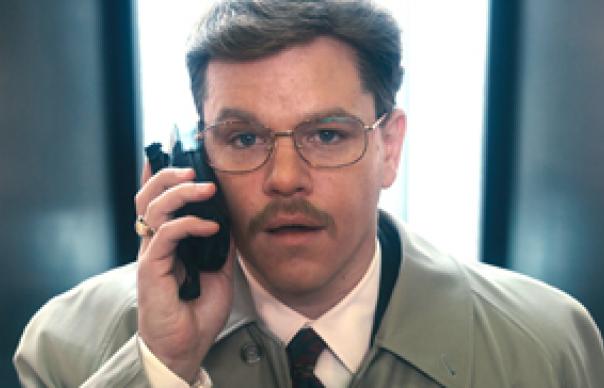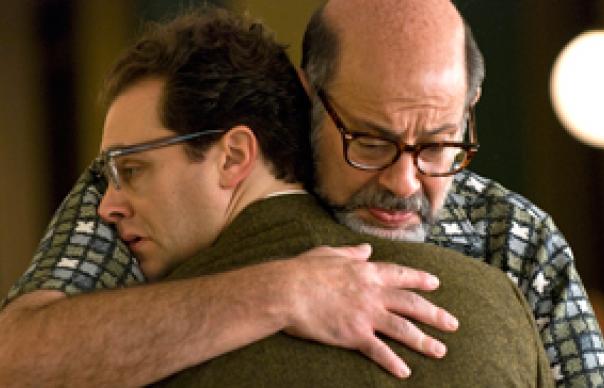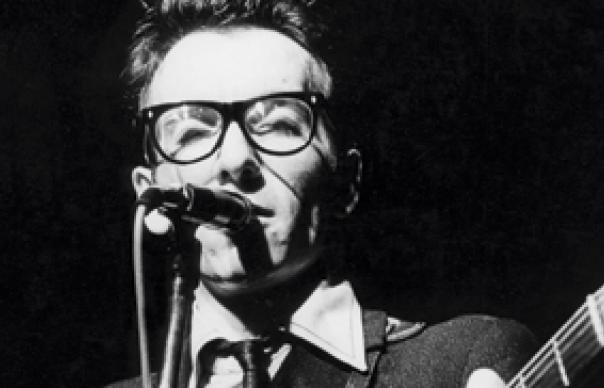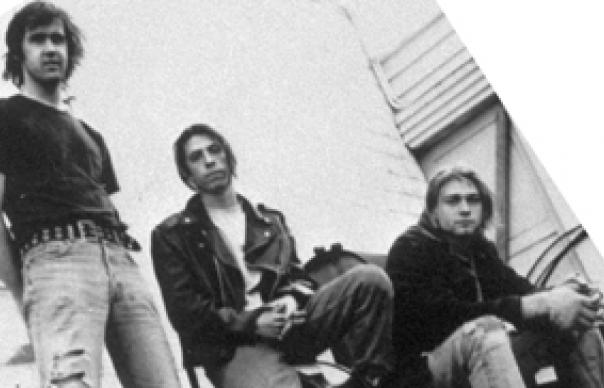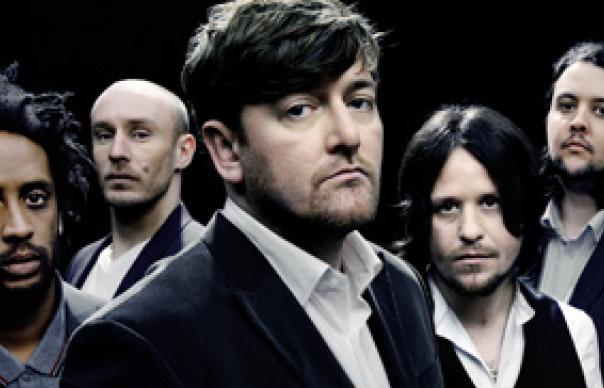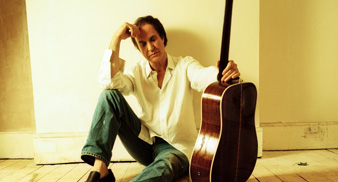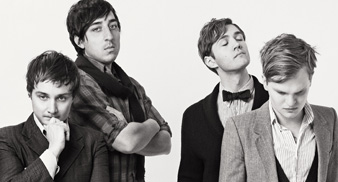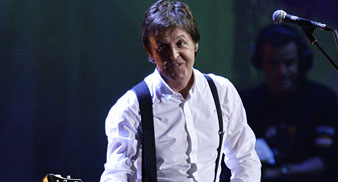Following on from yesterday's post about Tinariwen, here's a transcript of the Uncut Music Award judges discussing Animal Collective's "Merriweather Post Pavilion". Billy Bragg: There seems to be a lot of stuff out there, and in this award’s long list, where the ghost of Brian Wilson is strongly represented. It’s as if they’ve all invested in a Brian Wilson fader switch that they turn up and turn down at will; some put it to good use and others to not so good use, but I think Animal Collective put it to better use than most. Although I have to say that I’d already bought four of the eight albums that made the short list and Animal Collective wasn’t one of them. Tony Wadsworth: Yeah, the Pet Sounds/Smile influence was really clear. I thought it was really absorbing album, and I wish I’d been able to spend more time with it. I wasn’t aware of it before it made this list, but I think I’m gonna end up falling in love with it in a big way. At the moment I’ve not quite got beyond how clever it is, so it hasn’t had a chance to get to me as emotionally as, say, the Grizzly Bear album has. They’ve got similar influences, but I think Grizzly Bear do it in a much more intuitive way. Rachel Unthank: I found it quite difficult to get into, actually. It’s clever and creative, but I couldn’t find a way in, I couldn’t get any emotional interaction with it. Some of the others held my interest more, but I found myself falling asleep while listening to this. Dave Robinson: An album that puts you to sleep can be quite useful! I must admit that I didn’t really have any great opinion about it, I hadn’t heard them before. In going through the list generally I was looking for an album that had mood swings. I find it really odd listening to records where people have hidden their best track right down at the very bottom, and getting there can be a bit of an uphill struggle. It didn’t make a huge impression on me, I thought it was quite derivative, but in a nice kind of way. Bob Harris: I must convess that I had problems getting it out of its sleeve, not that we should be judging the packaging. Just getting through the folding box to the CD itself was a bit of a chore. However, when I finally managed to put it on my immediate reaction was that I was really gonna like it, but the more I’ve listened to it the less connected I’ve become to it. It’s really quite an odd thing. I’m always on the look-out for new things I haven’t heard before that I can play on my radio show, but I just found this album to be a bit cold. I was amazed that I did, because I’m a big fan of what are clearly Animal Collective’s own influences. Ultimately, it didn’t engage me, I think Rachel’s exactly right in her take on it. Allan Jones: I really like it. When I first played it, like several of you, I thought it was a bit cold but really clever, I could appreciate the technique behind it. But listening to it more I’ve really grown into it.
Arctic Monkeys to release another Oxfam ‘exclusive’ single
Arctic Monkeys are to release a special edition of their forthcoming single “Cornerstone” through Oxfam charity shops.
An exclusive 10″ vinyl version of the second single to be taken from the band’s third album Humbug, will be available in Oxfam shops from November 16.
B-sides will be three brand new Arctic Monkeys songs: ‘Catapult’, ‘Sketchead’ and ‘Fright Lined Dining Room’.
The vinyl version will come with MP3 download codes for all four tracks, plus the band are giving fans a chance to win a “golden ticket” for their upcoming tour, tickets being hidden in copies of the Oxfam vinyl.
See the official video for “Cornerstone” here:
The Informant!
- Uncut Film Review: THE INFORMANT!
- DIRECTED BY Steven Soderbergh
- STARRING Matt Damon, Scott Bakula, Melanie Lynskey
It’s the early 90s and affable, pudgy Mark Whitacre (Matt Damon) is a climber at agri-industry giants ADM when suddenly he elects to expose their price-fixing crimes to the FBI. He makes a slightly incompetent spy, wearing a wire, taping meetings. He loves to commentate: even his voiceover likens his actions to “a Grisham novel”. Yet the more Whitacre uncovers for the Feds’ anxious agent (Scott Bakula), the more cans of worms are opened. Our man on the inside, with his vivid imagination, may not be the most reliable of narrators…
Steven Soderbergh’s in his super-slick mode here: the film’s set in a suited, briefcase-carrying, male culture, although oddly its beige torpor feels more 1950s than 90s. For a purported comedy, laughs are few: indeed its descent into paranoia and deception is distressing. It may have felt like a coup to get The Sting’s Marvin Hamlisch to compose the score, but it’s jarringly jaunty. Only one role is fleshed out, and that’s Damon’s. With walrus ‘tache and a dazzling mix of the naive and the Machiavellian, his is, despite the movie’s lack of flair, one of the year’s stand-out performances.
CHRIS ROBERTS
A Serious Man
- Uncut film review: A SERIOUS MAN
- DIRECTED BY Joel and Ethan Coen
- STARRING Michael Stuhlbarg, Sari Lennick, Fred Melamed
SYNOPSIS
1967, Minnesota. Larry Gopkin, a university physics lecturer, is not a happy man. His dysfunctional family are causing him problems, and he’s equally beset by troubles at work. Yet Larry is a man of faith – the only question is whether his faith can help him through a divorce, his son’s bar mitzvah, his hapless brother’s extended stay on the couch, and his comely neighbour, who has a habit of sunbathing naked in the next door garden…
A Serious Man arrives at a time when the Coens stock as filmmakers arguably couldn’t be any higher. They picked up four Oscars for No Country For Old Men in 2007, and followed it last year up with the comedy Burn After Reading, toplined by their most multiplex friendly cast to date, including George Clooney and Brad Pitt. At this point, you think the Coens could make any kind of film they wanted, with an unlimited budget and the juicy pick of Hollywood’s A list theirs for the taking. So what do they do? They make an odd, inscrutable little film without any stars, set in the late 60s, and they pack it full of references to Jewish religious traditions and culture. And the first 15 minutes is a Yiddish-language prologue. Set in the 1900s. In Poland.
A Serious Man feels – initially, at least – like a return to an earlier kind of filmmaking for the Coens. There’s something about the film’s setting, a quiet Jewish enclave in suburban Minnesota, that reminds me of the loopy world of Fargo’s Brainerd, with its own set of habits and customs and unmanageable surnames. This Minnesota is a flat, nondescript place, full of identical sun-bleached houses with little square patches of lawn – the kind of suburban nightmare that filmmakers from David Lynch on have described as the epitome of evil itself.
1967, a year of considerable cultural upheaval, is rarely a concern for most people here. But that’s not to say that this is always going to be the case; there are signs that the world at large is beginning to creep in. And in many ways, A Serious Man is a jeremiad, concerned with the attempts of hapless university physics professor Larry Gopkin (Michael Stuhlbarg) to hold onto his faith as the wider, secular world intrudes. Stuhlbarg, an American stage actor with only a few films on his CV, is brilliant as the anxious, bespectacled Larry, pursing his lips and pulling his shoulders tighter into his body as the next humiliation hoves into view.
A Serious Man is structured, like a farce, as a series of incidents designed to push Larry’s beliefs to its limits. His young son, Danny, with his bar mitzvah looming, spends all his time listening to Jefferson Airplane on his headphones in school or smoking pot. His daughter, Sarah, is obsessed with getting a nose job. Larry’s brother, Arthur, is living on the sofa, filling a notebook with a genius/bonkers physics manifesto or locking himself in the toilet to drain a troublesome sebaceous cyst. At college, one of his students attempts to bribe him after failing his grades, then threatens to sue for defamation. The Columbia Records Club deluge him with phone calls about an account of which he has no knowledge. His neighbour’s wife, who sunbathes naked in full view of Larry, tempts him. And, worst of all, his own wife, Judith (Sari Lennick), is leaving him for a sanctimonious widower called Sy Abelman (Fred Melamed). But Larry, a good guy and a serious man – morally upstanding, a teacher, father – won’t retaliate.
Seeking guidance from a trio of Rabbis, Larry tries to find meaning in his misfortunes. Of course, the irony is clear enough that as a physics professor, Larry is used to dealing in scientific uncertainties – Schrödinger’s Cat and the Heisenberg Principle all get a look in – yet his faith is a matter of cast-iron fact. When he begins to question that, he encounters silence – or, at best, a fantastic joke involving the members of Jefferson Airplane. “It’s not always easy, deciphering what God is trying to tell you,” one character advises.
As ever with the Coens, you might wonder how much of all this is just a shaggy dog story. The prologue – an ersatz folk story, in which a couple are cursed by a man who may or may not be a ghost – and an lengthy anecdote about a Jewish dentist who finds Hebrew letters spelling the words “Help Me” on the backside of a goy’s teeth, might be relevant to the plot. Then again, it’s equally likely that they are not. It might be that A Serious Man is about how Shit Happens, and that, as Larry learns, trying to explain the random, capricious cruelty of the universe doesn’t ever yield anything. As the credits close, the words “No Jews were harmed in the making of this motion picture” appear on screen. It’s a great punchline. But in many ways, it’s also a fat lie: if anything, the Coens are playing God here, unleashing arbitrary and vindictive torments on Larry.
By the end, Larry is left asking exasperatedly for the umpteenth time: “Why me?” Only Grace Slick seems to get the point of this unusually cruel comedy: “When the truth is found to be lies/And all the joy within you dies/Don’t you want somebody to love.”
MICHAEL BONNER
Elvis Costello – Live At The El Mocambo
There are young people today who would find the idea of a dangerous Elvis Costello utterly implausible. What, that chummy chat-show host who writes operas in his spare time? Dangerous?! But he was. Between 1977 and 1980, Costello would have thought nothing of nailing your head to a coffee table while using sarcasm, dramatic irony and litotes. Boiling with rage behind misted-up specs, he contorted his body into geeky misshapes and spat out violently rhymed vendettas like a murderous Buddy Holly. Everything about him was geared towards putting the boot in. Perhaps because he ended up travelling so far from it, Costello has a complicated attitude towards his past. His official line is that people should investigate as much music as they dare (jazz, classical, Latin) rather than wallow in nostalgia. All the same, he approves the reissue of his Stiff/Radar/Demon catalogue every few years, with ever more desperate reconfigurations of bonus tracks. An announcement of yet another Costello reissue campaign may seem hard to justify as Britain prepares to live on baked beans for the next three years, but the twist is that this particular series, scheduled to run for 12 months, is dedicated exclusively to live recordings. The first release in the ‘Costello Show’ series is Live At The El Mocambo, a March 1978 concert by Elvis and his then-relatively new Attractions at a club in Toronto. Originally broadcast on a local FM station, and then released as a Canada-only promo LP, the recording was widely bootlegged in the ’80s before finally being issued as part of a 1993 boxset. In Costello chronology, Live At The El Mocambo falls between debut LP My Aim Is True (which North Americans had been able to buy since November 1977), and This Year’s Model, which came out in Britain 11 days after this gig. Costello and the Attractions – Steve Nieve (organ), Bruce Thomas (bass) and Pete Thomas (drums) – were supposedly promoting My Aim Is True, but were clearly keen to get audiences acclimatised to This Year’s Model, performing seven songs from it (in a 14-song set), plus “Radio Radio”, which would appear on US editions of that album. Costello, who was 23 at the time, had been hailed by critics across the Atlantic as a passionate, soulful newcomer in the Springsteen and Van Morrison traditions. With hindsight, it wasn’t quite that simple. We only have to hear his spoken introductions, in which his accent veers Jaggerishly from Cockney to Texan via Coronation Street, to appreciate that the young Costello was accelerating in several directions at once, seemingly anxious to find an identity only to demolish it. For the first third of this 51-minute concert, he appears to be waging war on the rave reviews for My Aim…, helping the Attractions (who hadn’t played on it) to attack its reputation for sophisticated songmanship like a sneering garage-band forced to do Top 40 covers. “Mystery Dance”, “Waiting For The End Of The World” and “Welcome To The Working Week” are a decent indication of how The Strangeloves might have sounded with Johnny Ramone on guitar. When it was a bootleg, …El Mocambo was admired for its sound quality. Now it’s official, one must mention some serious drawbacks. The mix is trebly, the audience too loud. Steve Nieve is difficult to hear. This wouldn’t have mattered to Toronto radio listeners in 1978, but it matters now, because the Attractions featured Nieve’s organ as a lead instrument and sound rather lost without him. Much, much more irritating than that, however, are the constant whoops and yeehaws – often in the middle of songs – from an idiot in the audience who thinks he’s watching a stripper. Approach this as an imperfect document of Costello’s once-dangerous nights, then. A sweaty photo taken at a time when he could get away with a joke about Canada’s former colony status (“We’ve come to ask for the country back”), and couldn’t have known what slings and arrows, and Bebe Buells and Bonnie Bramletts, lay just around the corner. DAVID CAVANAGH Latest and archive album reviews on Uncut.co.uk Latest music and film news on Uncut.co.uk PIC CREDIT: GUS STEWART
There are young people today who would find the idea of a dangerous Elvis Costello utterly implausible. What, that chummy chat-show host who writes operas in his spare time? Dangerous?! But he was. Between 1977 and 1980, Costello would have thought nothing of nailing your head to a coffee table while using sarcasm, dramatic irony and litotes. Boiling with rage behind misted-up specs, he contorted his body into geeky misshapes and spat out violently rhymed vendettas like a murderous Buddy Holly. Everything about him was geared towards putting the boot in.
Perhaps because he ended up travelling so far from it, Costello has a complicated attitude towards his past. His official line is that people should investigate as much music as they dare (jazz, classical, Latin) rather than wallow in nostalgia. All the same, he approves the reissue of his Stiff/Radar/Demon catalogue every few years, with ever more desperate reconfigurations of bonus tracks. An announcement of yet another Costello reissue campaign may seem hard to justify as Britain prepares to live on baked beans for the next three years, but the twist is that this particular series, scheduled to run for 12 months, is dedicated exclusively to live recordings.
The first release in the ‘Costello Show’ series is Live At The El Mocambo, a March 1978 concert by Elvis and his then-relatively new Attractions at a club in Toronto. Originally broadcast on a local FM station, and then released as a Canada-only promo LP, the recording was widely bootlegged in the ’80s before finally being issued as part of a 1993 boxset. In Costello chronology, Live At The El Mocambo falls between debut LP My Aim Is True (which North Americans had been able to buy since November 1977), and This Year’s Model, which came out in Britain 11 days after this gig. Costello and the Attractions – Steve Nieve (organ), Bruce Thomas (bass) and Pete Thomas (drums) – were supposedly promoting My Aim Is True, but were clearly keen to get audiences acclimatised to This Year’s Model, performing seven songs from it (in a 14-song set), plus “Radio Radio”, which would appear on US editions of that album.
Costello, who was 23 at the time, had been hailed by critics across the Atlantic as a passionate, soulful newcomer in the Springsteen and Van Morrison traditions. With hindsight, it wasn’t quite that simple. We only have to hear his spoken introductions, in which his accent veers Jaggerishly from Cockney to Texan via Coronation Street, to appreciate that the young Costello was accelerating in several directions at once, seemingly anxious to find an identity only to demolish it. For the first third of this 51-minute concert, he appears to be waging war on the rave reviews for My Aim…, helping the Attractions (who hadn’t played on it) to attack its reputation for sophisticated songmanship like a sneering garage-band forced to do Top 40 covers. “Mystery Dance”, “Waiting For The End Of The World” and “Welcome To The Working Week” are a decent indication of how The Strangeloves might have sounded with Johnny Ramone on guitar.
When it was a bootleg, …El Mocambo was admired for its sound quality. Now it’s official, one must mention some serious drawbacks. The mix is trebly, the audience too loud. Steve Nieve is difficult to hear. This wouldn’t have mattered to Toronto radio listeners in 1978, but it matters now, because the Attractions featured Nieve’s organ as a lead instrument and sound rather lost without him. Much, much more irritating than that, however, are the constant whoops and yeehaws – often in the middle of songs – from an idiot in the audience who thinks he’s watching a stripper.
Approach this as an imperfect document of Costello’s once-dangerous nights, then. A sweaty photo taken at a time when he could get away with a joke about Canada’s former colony status (“We’ve come to ask for the country back”), and couldn’t have known what slings and arrows, and Bebe Buells and Bonnie Bramletts, lay just around the corner.
DAVID CAVANAGH
Latest and archive album reviews on Uncut.co.uk
Latest music and film news on Uncut.co.uk
PIC CREDIT: GUS STEWART
Nirvana – Bleach (R1989)
This couldn’t be a more appropriate time to reissue Nirvana’s debut LP. This is so not because it’s been 20 years since Bleach’s release or because this year marks the 15th anniversary of Kurt Cobain’s suicide, but because Cobain’s ghost has recently made a rather jarring appearance in seemingly the only mass cultural form left: as an avatar in Guitar Hero 5. In a deliciously cheeky blow to the sanctimony surrounding alt.rock’s holy martyr, the virtual Cobain not only sings “Smells Like Teen Spirit” and “Lithium” but once unlocked can also be used to play such towering monuments to rock’n’roll liberation and anti-corporatism as “You Give Love A Bad Name” and “Play That Funky Music”. While that high-pitched wail you hear late at night may very well be the sound of Cobain screaming in his grave, this tongue-in-cheek heresy is exactly what’s needed to knock the preposterous halo off of Saint Kurt’s head. Bleach is where the beatification of Cobain started. The story goes like this: our divinely pure hero drives up to Seattle from his hick lumber town 100 miles away with $606.15 to record an album. He is so far above such crass, commercial and inauthentic notions as professionalism and preparation, that he hurriedly scrawls the lyrics on the way to the studio. Nonetheless, he manages to produce such a masterpiece of alienation and slacker self-loathing that Nirvana immediately ascends to the punk rock throne. According to legend, the tape the group listens to on the way to the studio has The Smithereens on one side and Celtic Frost on the other, the very blend of Beatles-aping melody and nihilistic metallic crunch that encapsulated Nirvana’s stylistic breakthrough. While it has always been an article of faith for the 50,000 or so people who actually heard Bleach before Nevermind made people seek it out in retrospect, it’s become increasingly fashionable (even among those who weren’t “there”) over the last few years to say that Bleach is the best Nirvana album – a patently absurd claim, but not one without its twisted merits. Although Bleach was produced by Jack Endino in true shoestring style – thus sounding like it was recorded through a condenser mic dangled in a Venti cup of Seattle sludge (and still does in this deluxe version remastered by Endino himself) – there are plenty of hooks and the band’s sensitivity to dynamics prevent the album from submerging in moroseness like so many other grunge records. This muddy mole rumble further retains the thuggery that gives Bleach a sense of menace wholly lacking from Butch Vig’s sharp edges on Nevermind and too often rubbed raw by Steve Albini’s abrasion on In Utero. But the best thing about Bleach just might be the lyrics, especially if you don’t buy all the “poet of a generation” malarkey. Much has been made of Cobain’s claim that the lyrics were written the night before the session and on the way to the studio. While the lyrics do feel tossed off and haphazard if not occasionally downright lousy (the comparison of Hell to high school with no recess on “School” – yeesh), the frankly New Age sincerity/intensity that characterised (and blighted) his lyrics from Nevermind on is thankfully absent. Instead, catchphrases (“In your eyes I’m not worth it”, “Here’s another word that rhymes with shame”) emerge from the murk to grab you by the throat even if they don’t “mean” anything. For all the talk of Nirvana being paradigm shifters, Bleach is not the sound of the bloated corpse of rock’n’roll being dragged around by the barbarians who stormed the gates. The album’s best song, “About A Girl”, could be a Hollies or Knickerbockers b-side. Cobain’s guitar owes an evident debt to Black Sabbath and The Stooges, not to mention Meat Puppets II and Black Flag’s My War. The drumming is leaden and lumpen and is often as lifeless as the Def Leppard syn drums they were seeking to kick over (Dave Grohl wouldn’t join the band until late 1990). They even cover Dutch psychedelic folk two-hit wonders Shocking Blue. Ultimately, Bleach is an excellent circa 1989 punk rock record and nothing more. The commitment to muck over punch keeps it firmly rooted in its time and place. Pre-Nevermind Nirvana was, however, truly transcendent on stage, and the second disc of Bleach Deluxe contains the complete recording of the group’s performance at Portland, Oregon’s Pine Street Theatre on February 9, 1990. In addition to the bulk of the songs from Bleach, there are versions of “Been A Son”, “Spank Thru” and “Dive”. Live, the heart attack guitar riffs on songs like “School” were set free, Krist Novoselic’s bass was as punishing as it needed to be, and you didn’t really notice how pedestrian drummer Chad Channing was. Plus, they regularly destroyed their equipment, which was, unless you were around to see Pete Townshend smash his guitar, incredibly exciting to see in the flesh. One small quibble, though: while it’s great to have documentation of the band’s early live sound (and in many ways the versions of the songs from Bleach are superior thanks to the sprightly energy), you don’t really get a sense of the sheer ferocity and electricity Nirvana generated in a tiny, cramped college bar. Also included is a neat cover of The Vaselines’ “Molly’s Lips”. Admittedly, it has more cred than the Bon Jovi or Wild Cherry tracks that his avatar will be playing on Guitar Hero 5. But it does suggest that Cobain was still committed to a vision of music with room for play and humour in it. And was not, in fact, the solemn sufferer for indie purity he’s become since his death. PETER SHAPIRO Latest and archive album reviews on Uncut.co.uk Latest music and film news on Uncut.co.uk
This couldn’t be a more appropriate time to reissue Nirvana’s debut LP. This is so not because it’s been 20 years since Bleach’s release or because this year marks the 15th anniversary of Kurt Cobain’s suicide, but because Cobain’s ghost has recently made a rather jarring appearance in seemingly the only mass cultural form left: as an avatar in Guitar Hero 5.
In a deliciously cheeky blow to the sanctimony surrounding alt.rock’s holy martyr, the virtual Cobain not only sings “Smells Like Teen Spirit” and “Lithium” but once unlocked can also be used to play such towering monuments to rock’n’roll liberation and anti-corporatism as “You Give Love A Bad Name” and “Play That Funky Music”. While that high-pitched wail you hear late at night may very well be the sound of Cobain screaming in his grave, this tongue-in-cheek heresy is exactly what’s needed to knock the preposterous halo off of Saint Kurt’s head.
Bleach is where the beatification of Cobain started. The story goes like this: our divinely pure hero drives up to Seattle from his hick lumber town 100 miles away with $606.15 to record an album. He is so far above such crass, commercial and inauthentic notions as professionalism and preparation, that he hurriedly scrawls the lyrics on the way to the studio. Nonetheless, he manages to produce such a masterpiece of alienation and slacker self-loathing that Nirvana immediately ascends to the punk rock throne. According to legend, the tape the group listens to on the way to the studio has The Smithereens on one side and Celtic Frost on the other, the very blend of Beatles-aping melody and nihilistic metallic crunch that encapsulated Nirvana’s stylistic breakthrough.
While it has always been an article of faith for the 50,000 or so people who actually heard Bleach before Nevermind made people seek it out in retrospect, it’s become increasingly fashionable (even among those who weren’t “there”) over the last few years to say that Bleach is the best Nirvana album – a patently absurd claim, but not one without its twisted merits.
Although Bleach was produced by Jack Endino in true shoestring style – thus sounding like it was recorded through a condenser mic dangled in a Venti cup of Seattle sludge (and still does in this deluxe version remastered by Endino himself) – there are plenty of hooks and the band’s sensitivity to dynamics prevent the album from submerging in moroseness like so many other grunge records. This muddy mole rumble further retains the thuggery that gives Bleach a sense of menace wholly lacking from Butch Vig’s sharp edges on Nevermind and too often rubbed raw by Steve Albini’s abrasion on In Utero.
But the best thing about Bleach just might be the lyrics, especially if you don’t buy all the “poet of a generation” malarkey. Much has been made of Cobain’s claim that the lyrics were written the night before the session and on the way to the studio. While the lyrics do feel tossed off and haphazard if not occasionally downright lousy (the comparison of Hell to high school with no recess on “School” – yeesh), the frankly New Age sincerity/intensity that characterised (and blighted) his lyrics from Nevermind on is thankfully absent. Instead, catchphrases (“In your eyes I’m not worth it”, “Here’s another word that rhymes with shame”) emerge from the murk to grab you by the throat even if they don’t “mean” anything.
For all the talk of Nirvana being paradigm shifters, Bleach is not the sound of the bloated corpse of rock’n’roll being dragged around by the barbarians who stormed the gates. The album’s best song, “About A Girl”, could be a Hollies or Knickerbockers b-side. Cobain’s guitar owes an evident debt to Black Sabbath and The Stooges, not to mention Meat Puppets II and Black Flag’s My War.
The drumming is leaden and lumpen and is often as lifeless as the Def Leppard syn drums they were seeking to kick over (Dave Grohl wouldn’t join the band until late 1990). They even cover Dutch psychedelic folk two-hit wonders Shocking Blue. Ultimately, Bleach is an excellent circa 1989 punk rock record and nothing more. The commitment to muck over punch keeps it firmly rooted in its time and place. Pre-Nevermind Nirvana was, however, truly transcendent on stage, and the second disc of Bleach Deluxe contains the complete recording of the group’s performance at Portland, Oregon’s Pine Street Theatre on February 9, 1990.
In addition to the bulk of the songs from Bleach, there are versions of “Been A Son”, “Spank Thru” and “Dive”. Live, the heart attack guitar riffs on songs like “School” were set free, Krist Novoselic’s bass was as punishing as it needed to be, and you didn’t really notice how pedestrian drummer Chad Channing was. Plus, they regularly destroyed their equipment, which was, unless you were around to see Pete Townshend smash his guitar, incredibly exciting to see in the flesh.
One small quibble, though: while it’s great to have documentation of the band’s early live sound (and in many ways the versions of the songs from Bleach are superior thanks to the sprightly energy), you don’t really get a sense of the sheer ferocity and electricity Nirvana generated in a tiny, cramped college bar.
Also included is a neat cover of The Vaselines’ “Molly’s Lips”. Admittedly, it has more cred than the Bon Jovi or Wild Cherry tracks that his avatar will be playing on Guitar Hero 5. But it does suggest that Cobain was still committed to a vision of music with room for play and humour in it. And was not, in fact, the solemn sufferer for indie purity he’s become since his death.
PETER SHAPIRO
Elbow – Asleep In The Back (R2001)
Listening again to Elbow’s debut deepens the mystery as to why popular opinion took a further seven years to swing in their favour. Those who first came to the Bury quintet with their 2008 Mercury Music award might take a while to warm to its darkly textured yearnings and foggy gloom, but there’s nothing here to frighten the natives. If it’s a more introspective showing of their psychedelic northern soul than subsequent LPs, it also shows that they’ve been channelling Talk Talk, The Verve and Robert Wyatt from day one. There’s proof, too, (eg “Newborn”, “Can’t Stop”) of how effortlessly Elbow surf the tides of musical faddism. SHARON O' CONNELL Latest and archive album reviews on Uncut.co.uk Latest music and film news on Uncut.co.uk
Listening again to Elbow’s debut deepens the mystery as to why popular opinion took a further seven years to swing in their favour.
Those who first came to the Bury quintet with their 2008 Mercury Music award might take a while to warm to its darkly textured yearnings and foggy gloom, but there’s nothing here to frighten the natives.
If it’s a more introspective showing of their psychedelic northern soul than subsequent LPs, it also shows that they’ve been channelling Talk Talk, The Verve and Robert Wyatt from day one. There’s proof, too, (eg “Newborn”, “Can’t Stop”) of how effortlessly Elbow surf the tides of musical faddism.
SHARON O’ CONNELL
Flight Of The Conchords – I Told You I Was Freaky
The second helping of this sitcom following Flight of the Conchords; Kiwi synth-poppers in New York, was almost as funny as the first, though most critics agreed the songs were weaker. There are certainly a few fillers here – and some highlights, like Kirsten Schaal’s “Dreams”, have been omitted – but at least half of these tracks are as good as anything on Series One. They include “You Don’t Have To Be A Prostitute” (a nod to The Police’s “Roxanne”), the Eminem-inspired “Hurt Feelings” and the Daft Punk-ish “Too Many Dicks (On The Dancefloor)”. Best of all is “Carol Brown”, in which Jemaine recounts 50 ways in which lovers have left him (“Britney? Britney hit me”) while being serenaded by a chorus of ex-partners (“yeah, shut up girlfriends of the past”). JOHN LEWIS Latest and archive album reviews on Uncut.co.uk Latest music and film news on Uncut.co.uk
The second helping of this sitcom following Flight of the Conchords; Kiwi synth-poppers in New York, was almost as funny as the first, though most critics agreed the songs were weaker.
There are certainly a few fillers here – and some highlights, like Kirsten Schaal’s “Dreams”, have been omitted – but at least half of these tracks are as good as anything on Series One.
They include “You Don’t Have To Be A Prostitute” (a nod to The Police’s “Roxanne”), the Eminem-inspired “Hurt Feelings” and the Daft Punk-ish “Too Many Dicks (On The Dancefloor)”.
Best of all is “Carol Brown”, in which Jemaine recounts 50 ways in which lovers have left him (“Britney? Britney hit me”) while being serenaded by a chorus of ex-partners (“yeah, shut up girlfriends of the past”).
JOHN LEWIS
Tinariwen: The Judges’ Verdict On Our 2009 Winners
Over the next few days, we'll be running full transcripts of the judges' meeting to decide the winner of 2009's Uncut Music Award. Today we begin with their thouhts on the winner, Tinariwen's "Imidiwan: Companions". Billy Bragg: The Tins, yeah, I really liked the Tinariwen album. It seems to be a bit more pulsating than their last one. I could put this on and listen to it all day, it takes me to a place where nothing else I’m hearing these days does. I’m not really sure how to explain it. I listen to a lot of African music, and the stuff I generally like has more classical African instrumentation. They get right to the roots of the music, not just African music, but they’ve really got it down to that pulsating rhythm. Maybe it’s because you don’t know what they’re singing about, you don’t focus on the lyrical content, so you’re more focused on the rhythmic power of it and the way it all comes together. Allan Jones: It kind of helps you realise what a great rock ‘n’ roll band they are. Bob Harris: They’re a great rock ‘n’ roll band, almost like an old school R&B band. Billy: Exactly! It’s not like they’ve gone back to the delta – well, they have, they’ve gone back to the Nile delta! – but they’ve gone back to the wellspring of the music that we love, and the fact that they’re using electric guitars in that way adds to it. Allan: It’s such an exciting guitar sound. Billy: Amazing. I think this band will be hugely influential; in the next couple of years we’ll be hearing young bands lifting the tensions and the rhythms of Tinariwen. You find yourself reaching back to the blues to explain what they do, it’s like they’ve turned the whole bloody thing upside down. Bob Harris: They were in the studio with me, and as we usually do we asked them to bring in a couple of tracks they might want us to play. They brought in John Lee Hooker and Jimi Hendrix. I mentioned earlier how I like an artist’s lifestyle to inform the music, and this is the definitive example of lifestyle spilling into music. Their story is so fascinating, the way that Ibrahim Ag Alhabib grew up into music. He was literally a wild four-year-old, his parents had been killed, and he’d never heard guitar before. He saw a guitar being played on a film being projected up against the wall of a building when he was seven years old, and couldn’t believe it what this thing was. So he made his own guitar, and he subsequently became known just as “Guitar” among everyone who knew him – he was the only person who had one of these things. It’s a very rebel background, as we know, but it’s much more than that. There are layers and layers here that I don’t think we will ever completely understand, there’s flavours and hints of so much in this music. If we’re talking about what’s the most amazing, creative, forward-looking, political record we’re discussing, then this album is very, very special. There’s a lot of words here, the language, that don’t completely or properly translate into English. There’s so much to discover, to know about this record, but you find yourself asking how much do I want to know, or how much do I just want to be entranced by it. Rachel Unthank: It’s hypnotic, isn’t it? It’s almost trance-inducing. I saw them at the Cambridge Folk Festival one year, I had a hangover and wasn’t really paying attention but it just took me over. Every time I put this album on the quality just shines through. It’s just so dark and brooding, and genuinely rock ‘n’ roll, compared to the gloss of Kings Of Leon. Billy: Well, the Kings Of Leon is where rock ‘n’ roll is, where it finds itself today, whereas Tinariwen are something more primal. Rachel: It’s quite easy to be enchanted by their story, because it’s exciting, but it’s not just some kind of world fusion where they’re playing some kind of world music and just stuck some electric guitars over the top of it. This is the way they’ve learned to play music, it’s from them, and you can hear that and it’s powerful. Dave Robinson: I loved this. I was very pleased you asked me to be on this panel, because I didn’t know much about a lot of these artists. When I go into a record shop it’s to buy something I’ve got in my mind, but trying to avoid the casual purchase that you take home and have to dump very quickly. I’d not heard Tinariwen before, and I just found this stunning. The mood washes over you, it’s a remarkable record. In the wake of all these other records it really stands out as something unique. I don’t care what he’s singing about, but I get a vibe of what he’s singing about. It’s probably the most impressive record of this bunch. We’ve talked about Kings Of Leon and I really think that it’s a really professional record where everything falls into place, it’s what you might expect from a career in western music, but this is in entirely a different class. Mark Cooper: The Kings Of Leon analogy is interesting, because this is Tinariwen’s third record, they’ve been touring since 2004. We’ve supported them a lot on Later..., but as sometimes happens with bands you think you know you let it pass you by, you think you already know the score. I didn’t listen to this when it first came out, I just thought it was going to be another Tinariwen record that’ll be great and I’ll catch up with it when I can. But I think it’s a quantum leap, it’s their best-produced record, it’s got the strongest songs. It distills Tinariwen and takes them to another level, and I’m really glad I did this panel because I probably would have otherwise taken them for granted because I considered myself a convert already. I love the first song [“Imidiwan Afrik Tendam”], I think it genuinely should be a single in the world I live in. It’s lighter, it’s a bit country-ish. When I first heard Tinariwen it helped me revive the word “heavy”, which I hadn’t been able to use since I first heard the Edgar Broughton Band! I also love the fact that this is a world music record that saves world music from the liberals. That’s really cool, I think a rock audience can like it, it’s not precious or worthy. It’s real. Tony Wadsworth: I find myself agreeing with what everyone else is saying, so I’ll try not to repeat anything. I think the guitar sound is probably the best I’ve heard in years, and it also makes it judge it in a different way, in much more real terms. I just think it’s mega, it’s so powerful. You know how with early rock ‘n’ roll records there’s only a few instruments but everything just sounds bigger? That’s what I get from this. Mark: They’re a band that everybody should and could love, given a chance. Talking about radio and the music industry, it’s hard not to believe that a couple of tracks here if they were given even half a chance could really hit big. Billy: No problem. Black geezers, don’t speak English, probably Muslim – easy sell! Who’s doing the promo on this one?! Mark: But I do think that the minute people get a chance to hear this stuff they’ll get it. It’s not hard to get. Allan: It speaks a common language, I think. You don’t have to have the lyrics translated to know what they’re talking about. You don’t need to listen to the words of rock ‘n’ roll to be excited by it. Billy: Well, this is very encouraging. I didn’t think they’d even get on the shortlist, but for them to emerge as the favourites is great. I really do think they are an Uncut band.
Over the next few days, we’ll be running full transcripts of the judges’ meeting to decide the winner of 2009’s Uncut Music Award. Today we begin with their thouhts on the winner, Tinariwen‘s “Imidiwan: Companions”.
Tinariwen Win The Uncut Music Award 2009!
Uncut is proud to announce that Tinariwen have won this year’s coveted Uncut Music Award. They succeed Fleet Foxes, who won the inaugural award for the most inspirational and rewarding album of the year in 2008.
Tinariwen’s fourth album, “Imidiwan: Companions”, triumphed over some very stiff competition on the shortlist from Kings of Leon, Bob Dylan, Wilco, Animal Collective and The Dirty Projectors. Grizzly Bear were placed second and The Low Anthem third.
Uncut ‘s Editor and chair of the judges Allan Jones said, “With so much great music to chose from, the judges’ task this year was extremely difficult, but in the end, the panel was unanimous in voting for Imidiwan.
“It’s a fantastically exciting record, full of great, powerful music, passionately and brilliantly played. It had everything the judges were looking for in a potential winner.”
Now in its second year, the Uncut Music Award has already gained a reputation as the most credible award in music. The artists’ nationality, age and sales figures are completely irrelevant as a judging panel of industry figures come together to decide on the winner.
Tinariwen were unanimously chosen,by a distinguished judging panel of eleven key industry figures who included musicians Billy Bragg, Rachel Unthank and Robin Pecknold of last year’s UMA winners, Fleet Foxes, broadcasters Mark Radcliffe, Bob Harris, Danny Kelly and Christian O’Connell and, ex-EMI chief executive and chair of the BPI Tony Wadsworth, Stiff Records founder Dave Robinson and Mark Cooper, BBC Head Of Music Entertainment.
Tinariwen are a band of Touareg musicians from the Sahara Desert region of northern Mali, whose mix of electric blues and Middle Eastern & African traditional drumming, has created a unique sound of their very own. Formed in 1979, they rose to prominence in the 1980s as the musical voice of a new political and social conscience in the southern Sahara. In the early 2000s, Tinariwen started to gain a following outside Africa, first in the world music community and then on the wider rock scene, through frequent tours and appearances at major festivals in Europe and the USA
Ibrahim Ag Alhabib of Tinariwen said of winning the Uncut Music Award: “This makes us really really happy, all of us and I’m glad that this important magazine should recognise our music. It gives us the strength to carry on working and spreading the message about the peace of our desert home, and I’m glad that our music can cross the frontiers and talk to people around the world. Thanks very very much.”
Billy Bragg, meanwhile, said, “I think this band will be hugely influential. In the next couple of years we’ll be hearing young bands lifting the tensions and the rhythms of Tinariwen. You find yourself reaching back to the blues to explain what they do, it’s like they’ve turned the whole bloody thing upside down. I really do think they are an Uncut band.”
BBC’s Creative Head of Music Entertainment Mark Cooper agreed: ‘I love the fact that this is a world music record that saves world music from the liberals. That’s really cool, I think a rock audience can like it, it’s not precious or worthy. It’s real.”
And Bob Harris added, “If we’re talking about what’s the most amazing, creative, forward-looking, political record we’re discussing, then this album is very, very special. There’s a lot of words here, that don’t completely or properly translate into English. There’s so much to discover, to know about this record, but you find yourself asking, ‘How much do I want to know, or how much do I just want to be entranced by it?”
The full shortlist in alphabetical order, was:
Animal Collective – Merriweather Post Pavilion (Domino)
Bob Dylan – Together Through Life (Columbia)
Dirty Projectors – Bitte Orca (Domino)
Grizzly Bear – Veckatimest (Warp)
Kings of Leon – Only By The Night (Columbia)
The Low Anthem – Oh My God Charlie Darwin (Bella Union)
Tinariwen – Imidiwan: Companions (Independiente)
Wilco – Wilco (Nonesuch)
To read the full transcript of the judges’ discussions about Tinariwen, visit our Uncut Music Award blog. We’ll post the rest of their comments on the other shortlisted albums over the next few days.
Them Crooked Vultures: “Them Crooked Vultures”
I imagine that when Dave Grohl, John Paul Jones and Josh Homme talk about Them Crooked Vultures (and there’s the first interview in tomorrow’s NME, apparently), there’ll be much talk of a creative partnership, a meeting of equals and so on. The truth about this sprawling, impressive debut album, though, is that, once you get past the marquee names, it’s ostensibly another Homme vehicle, with an all-star conceit not that much different from Queens Of The Stone Age’s career-topping “Songs For The Deaf” , on which Grohl also played drums. There’s little arguing with the vigour and pace of this rhythm section, of course – as Grohl thunders his way through, say, the accelerated motorik chugger “Dead End Friends”, it’s hard not to think of how much more fun he must be having here than in the increasingly mellow Foo Fighters. But “Them Crooked Vultures” comes frontloaded with Homme’s musical DNA: it’s his knotted, blocky sense of melody, his guitar sound – a fierce mathematical hybrid of ZZ Top and Devo, very roughly - which dominates these 13 songs. While weaker spirits, in the company of John Paul Jones, would automatically default to Led Zeppelin pastiches, Homme is, mostly, heroically incapable of straying too far from his chosen path. When he echoes an old song, it’s usually one of his: the malevolent stop-start dynamics of “Elephants”, for instance, is not a million miles away from “Song For The Dead”. When he resembles another singer, as on “Bandoliers”, it’s his old sparring partner Mark Lanegan, rather than Robert Plant. That said, Homme goes a bit goth Bowie on “Gunman”’s chorus, and he does manage a pretty good stab at Eric Clapton on “Scumbag Blues”, a faint relative of “Strange Brew” that confirms, after the Arctic Monkeys suggested as much, that Cream are much favoured at Rancho De La Luna. “Scumbag Blues” also features a needly, overdriven keyboard solo from Jones, very much in the vein of “Trampled Underfoot”. If there is a Led Zep side to “Them Crooked Vultures”, it’s definitely weighted towards “Physical Graffiti”, the odd “Communication Breakdown” hurtle apart. The monolithic, clod-hopping funk of, say, “Custard Pie” and “Houses Of The Holy” can occasionally be detected – though it’s as easy to compare “No One Loves Me” or “Reptiles” to Homme’s antics in the Eagles Of Death Metal. Like that last band, Homme can be a touch geeky; a song title like “Caligulove” might be funny with Jesse Hughes, but it feels somewhat gauche in the company of John Paul Jones. Also, while my appetite for eight-minute algebraic jams like “Warsaw Or The First Breath You Take” is unusually strong, “Them Crooked Vultures” is slightly, hairily long – as if Homme, thrilled by the opportunity to flex his muscles in such exalted company, wasn’t quite so assiduous in his editing. But this isn’t a new problem for him; maybe part of the richness of “Songs For The Deaf” is its excess. Whether the longueurs of “Them Crooked Vultures” turn out to be so rewarding remains to be seen. Still, not bad for a supergroup…
I imagine that when Dave Grohl, John Paul Jones and Josh Homme talk about Them Crooked Vultures (and there’s the first interview in tomorrow’s NME, apparently), there’ll be much talk of a creative partnership, a meeting of equals and so on.
Mountains: Club Uncut, November 5, 2009
A strange experience this morning. As I write, I’m listening to what seems to be a perfect recording of the Mountains show I saw last night at Club Uncut. As with a previous tour, which resulted in the superb “Etching” album, Brendon Anderegg and Koen Holtkamp rehearsed a new piece for the tour, recorded an early take on it, then produced CD-Rs to sell after each show. Feels a bit like cheating, really, as if I’m reviewing the album rather than the excellent 40-minute piece that the duo played at the Slaughtered Lamb last night. But that said, it’s not exactly identical: for this tour, Mountains are working without computers, firing up the old time-lag accumulator pedals and building a dense, immersive music live from scratch. So it begins with melodica and bells to create the requisite low drone tones and cosmic rustle, then gradually accrues momentum through another melodica, a couple of acoustic guitars (including some very deft and fulsome Fahey-ish picking that locates Mountains closer to folk music than the avant-garde, incidentally) and a meticulously deployed whisk; a bit of precise micro-detailing reminiscent of some of Matmos’ live sampling. The layering that goes on for the next 20 minutes is so intense that any thought of Mountains as an ambient band, or as minimalists, seems pretty laughable. One thing that’s apparent, though, is that even at their noisiest, there’s a highly resilient prettiness to the duo’s music which separates them, to a degree, from some fellow travellers with edgier or more ironised agendas, such as Emeralds, Ducktails or James Ferraro, maybe). After 20 minutes there’s a gentle hiatus of drones and wave sounds, a quick removal of actual physical layers (jumpers, jackets) as well as metaphorical ones, then they’re off again, rapidly ramping up the acoustic guitar loops into a vigorously aestheticised cacophony that recalls My Bloody Valentine and Seefeel as much as it does more common Mountains reference points like Fennesz and Popol Vuh. Forty minutes, and they’re through. Great show, and it sounded great again just now. Opening up the night – our first in the crashpad-like environment of The Slaughtered Lamb’s basement – were Pausal, who were fine, too: two men from London sat on the floor with a laptop and a guitar, a few projections on the sheet behind them, playing a blissed, neo-classical kind of ambience that occasionally reminded me of something like The Irresistible Force as well as the hipper reference points I used last time. Thanks to them, Mountains and everyone else who came down for another excellent show.
A strange experience this morning. As I write, I’m listening to what seems to be a perfect recording of the Mountains show I saw last night at Club Uncut. As with a previous tour, which resulted in the superb “Etching” album, Brendon Anderegg and Koen Holtkamp rehearsed a new piece for the tour, recorded an early take on it, then produced CD-Rs to sell after each show.
Ray Davies ends feud with Chrissie Hynde
Ray Davies and Chrissie Hynde have recorded a duet together, “Postcard From London”, which is due for release on December 7.
The Davies-penned tracked will be added to his ‘Kinks Choral Collection’ album which was released in June.
The video for the track, has been directed in London by accalimed film maker Julien Temple; and features landmarks from Davies career including: The Statue of Eros steps, Carnaby Street and Waterloo Bridge.
Joined by the Crouch End Festival Chorus, Ray Davies will also play some live dates next month:
- Cambridge, The Corn Exchange (December 11)
- Birmingham, Symphony Hall (12)
- Glasgow, Concert Hall (14)
- Manchester, The Bridgewater Hall (15)
- London, Hammersmith Apollo (19)
Animal Collective: “Campfire Songs”
I heard the other day that a brand new Animal Collective single was purportedly on its way, which samples Phil Lesh’s mighty “Unbroken Chain” one of my favourite Dead songs. First, though, there’s a reissue of 2003’s ghostly “Campfire Songs”; an album which, I guess, may come as something of a shock to people who’ve only been exposed to Animal Collective’s last couple of albums. Checking through the archives, it seems it was just over a year ago that I blogged about “Merriweather Post Pavilion”, which rapidly became one of the most viewed posts out of the 592 I’ve managed on Wild Mercury Sound, and maybe signalled to us how popular this extraordinary band were becoming. But where that album is fully-saturated and electrified, “Campfire Songs” reduces the Animal Collective sound to its bare, spindly bones. For a good while, this was actually my favourite AC album, and it still sounds great: Avey Tare and Panda Bear on a Maryland porch, strumming and harmonising in very dislocated, beatific fashion, while Geologist uses field recording techniques to capture not just their playing, but the ambience of their environment. If Animal Collective were once aligned to the whole freak-folk thing, it’s due in no small part to this album. Much of the five tracks seems loosely improvised on the spot, as one sigh and slither of melody gently coalesces into another. It’s interesting, though, listening to it with the knowledge of what the band have done since. Somehow, the tunes become more accessible, as a result, I guess, of our increasing familiarity with how Dave Portner and Noah Lennox construct songs. So while “Queen In My Pictures” opens “Campfire Songs” with nine-odd minutes of hesitant, strung-out acoustic ambience, it turns into “Doggy” (and there’s a title, rich with infantilism, that now looks programmed to wind up those who criticise AC as insufferably twee); a song which, treated differently, wouldn’t be much less striking than something like “My Girls”. It’s a lovely, intimate, immersive record, if you haven’t heard it before, and one which, while “Merriweather” seems very much of its precise time, feels comparatively ageless. Soon enough, Animal Collective would revisit these gaseous ideas, in more structured form, on “Sung Tongs” and, especially, the “Prospect Hummer” EP with Vashti Bunyan. In some ways, though, they were never gentler, or wilder, than here.
I heard the other day that a brand new Animal Collective single was purportedly on its way, which samples Phil Lesh’s mighty “Unbroken Chain” one of my favourite Dead songs. First, though, there’s a reissue of 2003’s ghostly “Campfire Songs”; an album which, I guess, may come as something of a shock to people who’ve only been exposed to Animal Collective’s last couple of albums.
Vampire Weekend announce new UK live dates
Vampire Weekend are to tour the UK early next year, to promote the release of their second album ‘Contra’.
As a taster for the new material, the band have made album track “Horchata” available to download free from their website, vampireweekend.com.
Tickets go on sale at 9am on Friday November 6.
Vampire Weekend’s 2010 UK dates will be:
- Cambridge Corn Exchange (February 7)
- Manchester Apollo (8)
- Leeds O2 Academy (9)
- Birmingham O2 Academy (10)
- Newcastle O2 Academy (12)
- Glasgow Barrowlands (13)
- Edinburgh Picture House (14)
- London O2 Academy Brixton (16)
Grizzly Bear announce more UK live dates for 2010
Grizzly Bear have announced more live dates to take place in the new year.
In addition to the previously announced London date on March 13, the band will now play Gateshead, Edinburgh, Brighton and Coventry too.
Uncut Music Award 2009 shortlisted nominees Grizzly Bear just performed with backing by the London Symphony Orchestra on Saturday October 31.
Read the full Grizzly Bear Barbican live review here
Plus, check out Uncut’s Grizzly Bear Uncut Music Award nomination here
Grizzly Bear’s 2010 UK tour dates are:
Gateshead The Sage (March 8)
Edinburgh Queens Hall (9)
Brighton Corn Exchange (11)
Coventry Warwick Arts Centre (12)
London Roundhouse (13)
The 40th Uncut Playlist Of 2009
Back from a week away, then, to discover that a few records have managed to limp through – at least digitally – in the face of the postal strike. Prominent here I guess are that rarity, something promised by Neil Young that actually turns up, and Them Crooked Vultures, with Josh Homme playing Alpha Male with John Paul Jones and Dave Grohl. Both pretty interesting, and I’ll endeavour to write more in the next few days, heinous mag deadlines notwithstanding. 1 Moon Duo – Moon Duo EP (CD-R) 2 Them Crooked Vultures – Them Crooked Vultures (Columbia) 3 Fever Ray – Live (Rabid/The Guardian) 4 Elvis Costello – Live At The El Mocambo (Universal) 5 Neil Young – Dreamin’ Man: Live ’92 (Reprise) 6 Josephine Foster – Graphic As A Star (Fire) 7 Jaga Jazzist – One-Armed Bandit (Ninja Tune) 8 Position Normal – Position Normal (Rum Records) 9 Spirit – Fresh From The Time Coast: The Best Of 1968-1977 (Raven) 10 Miles Davis – Isle Of Wight, August 29, 1970 (From The Complete Columbia Album Collection, Columbia/Legacy) 11 Delphic – Acolyte (Chimeric/Polydor) 12 Gary War – Horribles Parade (Sacred Bones)
Back from a week away, then, to discover that a few records have managed to limp through – at least digitally – in the face of the postal strike. Prominent here I guess are that rarity, something promised by Neil Young that actually turns up, and Them Crooked Vultures, with Josh Homme playing Alpha Male with John Paul Jones and Dave Grohl.
New Paul McCartney studio track streams online
Paul McCartney has contributed a brand new song “(I Want To) Come Home” to the soundtrack for new movie Everybody’s Fine – and it has been posted online.
The film also stars Drew Barrymore, Kate Beckinsale and Sam Rockwell.
The film, starring Robert De Niro is released nationwide on December 4, but you can hear Macca’s new track below.
McCartney says he identified with De Niro‘s character in the film, and easily wrote the song in just one evening, saying: “I could definitely identify with Robert De Niro’s character because I have grown-up kids who have their own families.”
The film also stars Drew Barrymore, Kate Beckinsale and Sam Rockwell.
http://www.youtube.com/watch?v=S1IkglgdQ5Y&hl=en&fs=1
See the tailer for Everybody’s Fine here:
Latest music and film news on Uncut.co.uk
Pic credit: PA Photos
Grizzly Bear pair up with London Symphony Orchestra
Uncut Music Award 2009 shortlisted nominees Grizzly Bear performed with backing by the London Symphony Orchestra on Saturday (October 31)
Read the full Grizzly Bear live review here
Plus, check out Uncut’s Grizzly Bear Uncut Music Award nomination here
Grizzly Bear’s London Barbican set list was:
‘Easier’
‘Cheerleader’
‘Southern Point’
‘Central And Remote’
‘All We Ask’
‘Knife’
‘Fine For Now’
‘Two Weeks’
‘Dory’
‘Ready Able’
‘While You Wait For The Others’
‘He Hit Me (And It Felt Like A Kiss)’
‘I Live With You’
‘Foreground’
Neil Young’s ‘Dreamin Man’ album gets UK release date
Neil Young 12th album in the Archives Performance Series, ‘Dreamin’ Man’ – Live ’92’ is to be released in the UK on December 6.
Originally touted for release this week (November 2), ‘Dreamin’ Man’ features Harvest Moon songs, performed solo and acoustic, recorded live before the album was originally released.
Neil Young’s Dreamin’ Man track listing is:
“Dreamin’ Man”
“Such A Woman”
“One Of These Days”
“Harvest Moon”
“You and Me”
“From Hank To Hendrix”
“Unknown Legend”
“Old King”
“Natural Beauty”
“War of Man”
Latest music and film news on Uncut.co.uk
Pic credit: PA Photos


